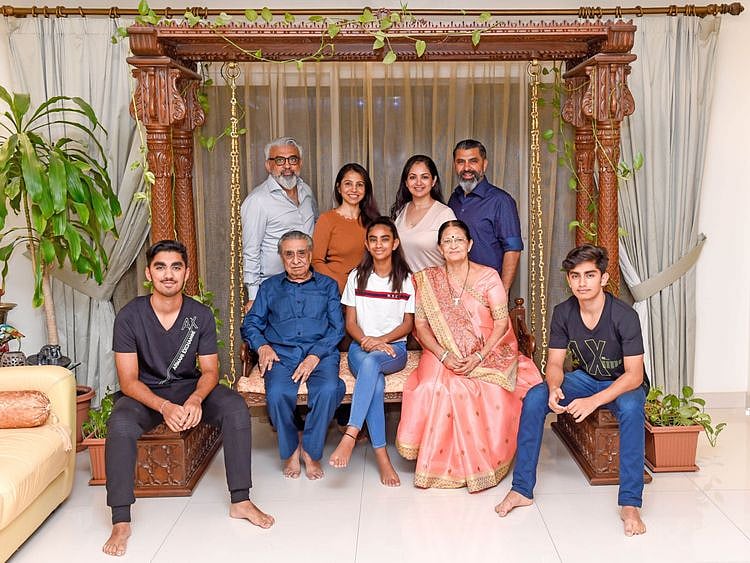Three generations of tolerance binds this family
Parmar family, whose first generation came to UAE in 1956, believes in live and let live

DUBAI: Three generations of the Parmar family have been peacefully co-existing in the UAE with most members contributing to the family’s tailoring business that was started in 1956.
Pitamber Nagji Parmar 86, the patriarch of the family, looks back at how it was love and tolerance that endeared him to Dubai and gave him the strength to keep all members as a cohesive whole.
Parmar, along with his wife Vijaya Parmar (82) began their life in UAE over 60 years ago and built it up stitch by stich literally being breadwinners for their six children and later, grandchildren. Parmar, who has been going to work six days a week for the last 50 years, feels tolerance has a got to with respect and dignity. He feels tolerance is a noble emotion within one which manifests in behaviour all around, beginning with community, work place and family.
He said: “In the early sixties, when we lived in little compounds in Bastakiya, with 10 other families, love and cooperation for all was a given. My children learned from the best in our community. We all had mutual respect for each other’s culture. I extended this sentiment tolerance at home too giving breathing space to my sons. The youngest son Prakash joined me in family business while eldest Bharat chose to work in the cooling industry. My second son Dharmendra studied electronic engineering and pursued a career in that industry. It was love, respect and tolerance for each other that helped us stay as a joint family right until 2010. All my three sons, their wives and kids lived together under one roof until we decided to buy villas close to each other and now reside independently in close contact and in spirit always connected.”
Prakash Parmar, his son youngest son who followed into his father’s footsteps into the tailoring business as a young adult, told Gulf News: “My father had a vision as a business person and because we respected him, I decided not to question him and joined the tailoring business. This was my tolerance which had a component of deep trust in his instinct and eventually I grew to love my work. I feel in the lack of proper guidance, people create their own demons.”
Prakash said that the Parmar family followed an unwritten rule. “We send our sons to a boarding school in India from the age of 9-12. These three years is a rite of passage for them, it takes them out of their comfort zone, teaches them the meaning of true tolerance and coexistence and they come back better equipped to meld into society. At the same time we all have given our kids the freedom to choose their hobbies, their streams of studies and their careers. In business, my brothers and I have a golden rule, we agree to disagree, argue about all issues, but once work is over, we joke and share our meals. That is because the culture of tolerance runs deep in our veins.
Prakash’s sons, twins Ashish and Akash, both 15, studying at the Choueifat School Dubai, feel they have learnt the best traditions of tolerance from the cosmopolitan ethos of their school, the unique bonding of their family and the attitude of freedom and mutual respect inculcated by their father. “As twins we have learnt to give each other a lot of breathing space as we have had many milestones together,” said Ashish.
Akash added : “At home we have learnt the best traditions of tolerance from our grandfather and grandmother. All cousins and siblings in the large extended family have so much love and mutual respect for each other and that I thinks is the most important element of tolerance. We are into each other’s lives, but at the same time give each other space to grow, something that my grandad followed in the case of his sons and now they are following in bringing us up. We are in safe hands, learning from the experts.”
Sign up for the Daily Briefing
Get the latest news and updates straight to your inbox
Network Links
GN StoreDownload our app
© Al Nisr Publishing LLC 2026. All rights reserved.